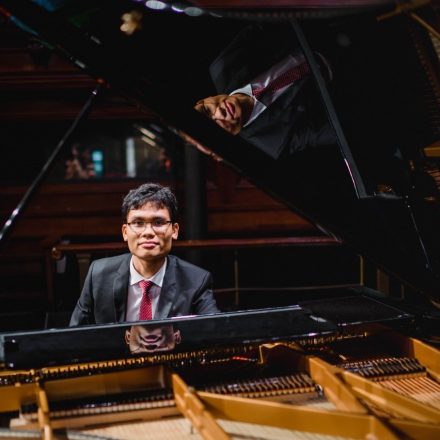SYDNEY INTERNATIONAL PIANO COMPETITION
Day 6, Session 10
Tuesday July 6, 2021
When you get right down to it, there are 8 Russian entrants in this competition; that’s a quarter of the total. Chinese musicians are next in the poll with 6, then Japan and Ukraine tie on 3 each. Not that this means anything much, except to bear further witness to the devotion that Russians have for competitions, vide the Olympic Games. Belyavsky was another of Piers Lane’s last minute substitutes to maintain the set number of participants at 32, and he is yet another pianist who rushed – or was rushed – to put his programs together. He is, apparently, the only player who has taken part in a previous Sydney competition, having appeared in the 2016 extravaganza.
But let’s not be flippant: it was certainly an advantage for Belyavsky to have something to aim towards as, according to his pre-recital interview, appearances have been scarce for him and for most of his colleagues. We (and the competition organizers) were lucky to have him on the books. Which is more than can be said for his home country, it seems. Belyavsky did his recording at the Russian State Specialized Academy of Arts in Moscow on April 9. Before he began, patrons were screened a message pointing out discrepancies between sight and sound on the tape; doesn’t matter much to me because I’ve usually got my head in a score, although I did watch his Australian piece (another Vine Bagatelle, would you believe) . What was depressing was his – no, the Academy’s – instrument: a Steinway with an F5 clearly out of tune, and some other notes on the border of the same fault.
So much for care of musicians in Putin’s regime. But, working against the odds of a late call-up and a deficient instrument, Belyavsky gave a solid program comprising Schubert’s Wanderer-Fantasie and three of the Transcendental Etudes by Liszt: No. 12 Chasse-neige, No 5 Feux follets, No. 11 Harmonies du soir. He encored with one of Vine’s 5 Bagatelles – the untitled IV.
The fantasie came across with excellent drive in its first phases, boasting an onward thrust that only occasionally held itself up, as at an oddly solid pause before bar 108, even allowing for the leap and tonality change involved. The pianist displayed a fine responsiveness to the melodic outline of the Adagio, giving it plenty of breathing space and rubato, all of it comprehensible in context. Very few notes disappeared in the hemi-demisemiquaver figuration edifices across bars 227 to 245, which is saying something as the action is relentless here.
An infectious Viennese lilt informed the Presto which managed to avoid the steely edge that many interpreters aim for. Later, Belyavsky maintained an attractive clarity across the long arpeggio run from bar 564 to bar 585 and his texture remained a sensible model of restraint even when the action got messy from bar 627 on. To his credit, the executant gave us a suitably clangorous set of final pages, but the mesh was not over-pedalled or ineptly thunderous.
Liszt’s Chasse-neige etude made its muffled points with high success. I could pinpoint no obvious errors that I’d swear to, but it’s a rapid-fire exercise and Belyavsky brought out its unsettled, enervating character. The Etude No. 5, another rapid piece, worked well enough with its restless chromatic cluster-runs and a few excellent throw-away right-hand moments starting at bar 124 where the approach sounded ideal for this swindling-away-to-nothing conclusion. Of the three pieces, I preferred the last, Harmonies du soir, probably because you have solid material to deal with, and Belyavsky coped with the initial flourishes well enough but blossomed at the consolidation process of the Poco piu mosso with telling individuality. His execution of detail and even negotiation of those ever-present arpeggios were highlights of his recital; indeed, throughout this piece you realized that you were listening to an artist with character, with something to communicate beyond the predictable, who can stir up excitement but knows just how to pitch it and withdraw intelligently.
Vine’s Bagatelle IV is instantly recognizable for its jazzy/bluesy strut and craft in making much of a deft chord sequence or two. Belyavsky handled it with an attractive fusion of spirit and control, keeping the pace active and delighting with his unexpected insouciance, especially his leisurely left-arm lean in the final bars.
Abdiel was classified for the competition as Australian/Indonesian, although he seems to have spent most of his later educational years in Sydney. He recorded his program on March 21 in Verbruggen Hall in that city’s Conservatorium of Music, which is the competition’s usual focus; as well, he had a small audience – an asset/drawback not available to most of the other entrants. Compared to the purity of the preceding program, Abdiel’s was multi-faceted, beginning with Scriabin’s Sonata No. 5. Right from the start, you were instantly aware of this pianist’s brilliant technical armoury; it was well-tested in this extremely taxing work which exemplifies to the full its creator’s neurasthenic personality. Abdiel held back little, content to smash out an abrupt climactic point, like the imperioso at bar 107. Yet, you could not complain that sense disappeared in welters of fabric as the sprightly textures remained just that: the wonder lay in the abrupt twists from thunder to Mendelssohnian friskiness.
As with nearly everything presented here, Abdiel faced you with breathtaking facility illuminated by passages of remarkable accomplishment, like the outburst at bar 144 – one of many – that impressed for its fire and its fluency. The executant seemed engrossed by the work’s internal obsessiveness, like the Languido repeats and the leggierissimo volando beginning at bar 235. Not that Abdiel took everything at face value; he made free with some of the detail like the irregular groups of 4 and 5 from bar 300 onward. But the whole melange was delivered with unstoppable conviction, leading to a final two bars that impressed so much more in performance than they do on paper.
Two Debussy Preludes followed the ultra-virtuosic trend. Les collines d’Anacapri startled for its percussive interpretation. Even Modere et expressif in the middle section was heavy-handed and the over-riding Vif proved numbingly rapid. Feux d’artifice, as expected, was brilliantly achieved, a marvellous exhibition from this musician who showed the cleanest pair of heels I’ve come across in this glittering jewel.
The Three Movements from Petrushka that Stravinsky put together for Arthur Rubinstein gave a centre to this program, and it enjoyed an unusually glittering reading. The Russian Dance held no hesitations or pauses but was treated with a fearless directness, even in those trademark sequences of block chords that ask for both rapid finger adjustment and full shoulder heft. No time for relaxation in Petrushka’s Room, either; the second appearance of the famous tritone was taken at a very fast pace, and the ten-bar Furioso enjoyed a massive pounding, including a final D Major chord that I thought would damage the instrument. Set against that an extraordinarily clean handling of the massive trills 11 bars from the movement’s end. The energy and fluency of The Shrovetide Fair probably took the night’s honours: a dazzling display as Abdiel burst through each of the composer’s scenarios – the nurses, gypsies, coachmen, bear and peasant – with masterful ebullience that occasionally bordered on hysteria.
But this was a display night and the presenter wasn’t finished. The program proper ended with a Scriabin study, the D flat Major from Op. 8, which simply put a hothouse-grown cherry on the pianist’s cake. An exercise in right-hand 3rds, it floated past with effortless ease, not making much impression on those of us left gasping in the wake of Abdel’s Stravinsky. And as an encore, he veered away from Vine’s little pieces and went the whole hog: Grainger’s In Dahomey ‘Cakewalk smasher’, where the clue is in the last word. For my taste, this was performed too fast, to the point where it occasionally made no sense. A brilliant negotiation of the score, I’ll be the first to attest, but not true to the composer, clogging his period piece with tumultuous overkill.

